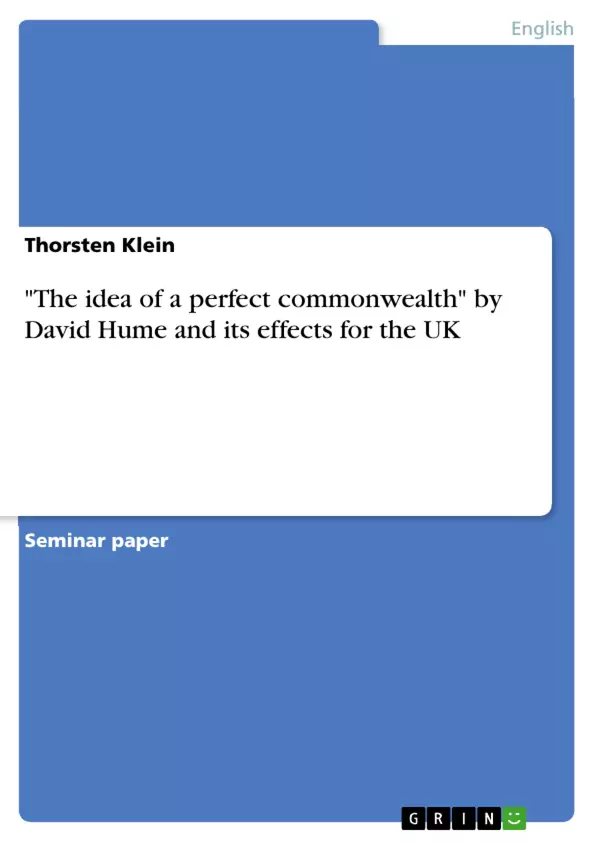One of Hume´s famous essays, “The idea of a perfect commonwealth”, is based on the consideration to create a new form of government, “the most perfect of all” [page 513; line 13]. Hume thinks it is one of the most important thoughts man´s wit can consider. The present “governments seem to serve the purpose of society” [513; 14- 15], but they are not perfect and do not work accurately. It is advantageous to know what is the most perfect commonwealth, because it is the best way to improve existing governmental systems and constitutions as far as possible towards perfection without giving “too great disturbance to society” [514; 2]. An established government, recommended by antiquity, has great advantage and is for that reason accepted by mankind. Philosophers, like him, have to respect this fact, but with their ideas they “may attempt some improvements for the public good” [512, 13- 513, 1] without shaking a constitution or government to the very foundations.
Another chance of his theory for the future, may be to establish a perfect commonwealth, where an old one vanishes or where men combine to form a new one, as he proposes, “in some distant part of the world” [513; 23- 24].
David Humes´ plan of the perfect government resembles the model of James Harrington´s Commonwealth of Oceana, as he claims the only valuable model. Before presenting his own theory, he describes the main inconveniences of the Oceana. The rotation of public employment by intervals and the Agrarian, because of the risk of abuse, are “impracticable” [514; 4]. The third criticism is the negative, the senate has upon the people. It does not provide enough security for liberty, because the negative of the senate goes before the vote of the people. That is unacceptable for Hume. Liberty gets out of balance, if the legislative has got the power to decide, which propositions they let the people vote upon. Hume reminds of the King´s negative in the English constitution and describes the consequences, if the negative of the King came, before a popular bill reaches the parliament to be debated. If this was the case, the King of Britain “would be an absolute monarch” [515; 15- 16]. According to Hume, the main defect of the Oceana is, that “the whole legislature (...) rest(s) in the senate” [516; 5].
Inhaltsverzeichnis (Table of Contents)
- (1) The importance to create a perfect commonwealth
- (2) The idea of a perfect commonwealth
- The senate
- The councils
- The court of competitors
- The militia
- Payment
- The combination and the division of a senate
- The security and stability of the commonwealth
- (3) Alterations on the British government
- (4) Hume's conclusion
Zielsetzung und Themenschwerpunkte (Objectives and Key Themes)
This essay explores the concept of a perfect commonwealth, analyzing the potential benefits and drawbacks of various governmental systems. Hume’s primary objective is to present his own model for a perfect commonwealth, drawing inspiration from existing models while proposing significant modifications.
- The importance of creating a perfect commonwealth
- The features and structure of a perfect commonwealth
- Critiques of existing governmental models, particularly the model of Oceana
- Hume’s proposed alterations to the British government
- The sustainability and potential longevity of a perfect commonwealth
Zusammenfassung der Kapitel (Chapter Summaries)
(1) The importance to create a perfect commonwealth
Hume argues that the pursuit of a perfect commonwealth is a crucial endeavor, as existing governmental systems, while functional, are not perfect. He emphasizes the value of understanding an ideal form of government to guide improvements in existing systems without causing significant disruption. Hume suggests that a perfect commonwealth could be established in a new territory or as a replacement for a failing government.
(2) The idea of a perfect commonwealth
This chapter outlines Hume’s vision for a perfect commonwealth. It proposes a structure based on a division of power between counties and a central senate. The senate holds executive power, while the county representatives exercise legislative authority. Hume’s model includes a system of checks and balances, ensuring that no single branch of government holds absolute power.
(3) Alterations on the British government
Drawing from his theory of the perfect commonwealth, Hume proposes specific changes to the British governmental system. He advocates for a reformed parliament with equitable representation and a revised House of Lords consisting of individuals of high standing. This revised system, termed a “limited monarchy,” aims to balance the power of the monarchy with a more representative legislature.
Schlüsselwörter (Keywords)
This essay focuses on the concept of a perfect commonwealth, analyzing the features and structure of an ideal form of government. Key themes include the balance of power, representation, and the limitations of existing governmental models. Hume’s model incorporates a system of checks and balances, a division of power between local and central government, and a focus on responsible governance.
Frequently Asked Questions
What is David Hume's "perfect commonwealth"?
It is an ideal model of government proposed by Hume to improve existing systems towards perfection without causing social disturbance.
How does Hume's model differ from James Harrington's "Oceana"?
Hume criticizes Harrington's rotation of employment and the agrarian laws as impracticable, and argues that Harrington's senate held too much power over the people.
What changes did Hume propose for the British government?
He advocated for a reformed parliament with equitable representation and a revised House of Lords to create a balanced "limited monarchy."
What is the role of the senate in Hume's perfect commonwealth?
The senate holds executive power, while legislative authority is exercised by county representatives, creating a system of checks and balances.
Why does Hume believe an ideal government model is useful?
It serves as a benchmark for making improvements to existing constitutions and can be used when establishing new governments in distant parts of the world.
- Citar trabajo
- Thorsten Klein (Autor), 2001, "The idea of a perfect commonwealth" by David Hume and its effects for the UK, Múnich, GRIN Verlag, https://www.grin.com/document/62419



